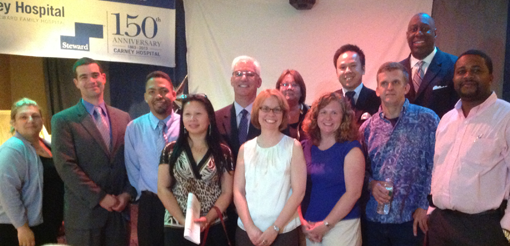June 27, 2013
A year ago, Andy Davis was busy making the rounds of civic groups, peace walks, and block parties to introduce himself as the new president of Carney Hospital. Thrust into the leadership role on the heels of the sudden and controversial departure of a popular hometown figure, Davis, 42, proved well suited to the role: Tall, affable, and down-home charming with his small-town Florida cadence, Davis quickly became a welcome public face of Carney.
A year into his tenure, Davis continues to be a fixture on the neighborhood’s civic circuit, constantly plugging Dorchester’s only community hospital, which turns 150 years old this week. In a city with a deep well of health care facilities at its disposal, Davis’s pitch is simple: Carney is a convenient, affordable, and high-quality option for Dorchester and Mattapan residents who’d prefer to avoid the congestion and higher costs of downtown hospitals.
Aside from keeping the Carney solvent, the job of selling the Dot Ave. campus remains one of Davis’s chief tasks. And he has found that he does it best by bringing the Carney message to his audience in small settings— from church basements to Chinese restaurants.
 Davis makes case to Main Streets: Fields Corner Main Street's Board of Directors are shown with Carney Hospital President Andy Davis (second from right) at the group’s 2013 Annual Meeting last Tuesday at Saigon Seafood. Carney Hospital became a supporter of FCMS with a $5,000 contribution.
Davis makes case to Main Streets: Fields Corner Main Street's Board of Directors are shown with Carney Hospital President Andy Davis (second from right) at the group’s 2013 Annual Meeting last Tuesday at Saigon Seafood. Carney Hospital became a supporter of FCMS with a $5,000 contribution.
“We have to push the Carney to a state of excellence, not just to be a good hospital,” Davis said in an interview this week. He makes a strong case that the inaugural year on his watch has been a successful one: The bottom line, he says, is that Carney’s financial picture is better than when he arrived in May 2012.
“Over the last several months we’ve seen the health of the hospital improve,” Davis told the Reporter. He attributes the stabilization to cost-cutting and a modest growth in surgical volume, particularly in specialty areas including ear, nose, and throat procedures. The emergency room, Davis says, continues to see an increase in visits of 4-5 percent per year, a trend that preceded his arrival.
Last week, the Carney announced another big development that bodes well for its future growth and stability. The hospital’s Family Medicine Residency Program— planted by Davis’s predecessor Bill Walczak during his brief tenure in 2011— received accreditation from the Council for Graduate Medical Education, a national outfit that will clear the way for new doctors to begin training at Carney in 2014. The program will accept eight new doctors over the next three years, Davis said.
“Our Family Medicine Department is central to the hospital’s ability to make culturally competent primary care available to the communities we serve,” Davis said in announcing the news. “The residency program will also provide the hospital with the opportunity to identify and train our own outstanding young physicians as our Family Medicine Department continues to grow.”
The Family Medicine practices that each new doctor will likely develop hold the promise of new referrals for the Dorchester campus – a seeding for the long-term that should serve the Carney well in years to come. It will mark the second such on-site residency program at Carney, which maintains a long-running residency program in Internal Medicine with Tufts University School of Medicine.
“We are already a teaching hospital,” Davis notes.
Davis has also made headway in building connections with some of Dorchester’s existing neighborhood health centers— most of whom have well-established, formal links with downtown teaching hospitals. Davis told the Reporter this week that the Carney has recently formed a partnership with Harvard Street Neighborhood Health Center. And the hospital has begun to work closely with the Dorchester YMCA to assist its members with diabetes management. Davis also points to substantial donations from Carney to groups like Fields Corner Main Streets and Mattapan Square Main Streets – partnerships that Davis has forged to increase Carney’s profile among the neighborhood’s business community.
“We didn’t have those partnerships this time last year,” Davis said.
In year two, he says, the focus will be on more of the same, but with a celebratory theme. The hospital is gearing up for a September event to mark its 150th year in operation. (The hospital was founded in South Boston in 1863 and moved to its Dorchester campus in 1953.) The details of the fall celebration have not yet been finalized, but Davis says that “people who’ve been a part of Carney’s history” will be invited to attend.
“One hundred and fifty years in business is an impressive milestone, even in New England, where some places have been around a lot longer than that,” Davis says with a smiles “We’ll have a nice celebration. There’s a strong feeling about Carney still, even among those who are OFD. They know how important this place was — and is— to Dorchester.”
Topics:


